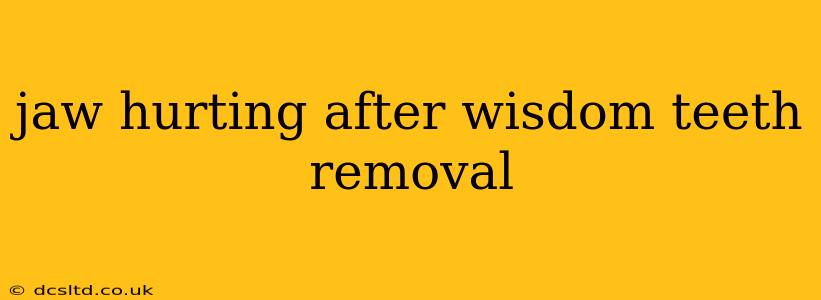Having your wisdom teeth removed is a significant oral surgery, and experiencing jaw pain afterward is quite common. This pain can range from mild discomfort to intense throbbing, significantly impacting your ability to eat, speak, and even sleep. Understanding the causes of this pain, how to manage it, and what to expect during recovery is crucial for a smoother healing process.
Why Does My Jaw Hurt After Wisdom Teeth Removal?
Post-wisdom tooth extraction jaw pain stems from several factors:
- Surgical trauma: The removal process itself involves incisions, bone removal (in some cases), and manipulation of tissues. This trauma naturally causes inflammation and pain.
- Inflammation: Your body's natural inflammatory response to the surgery is a major contributor to jaw pain. Swelling around the extraction sites puts pressure on the jaw muscles and nerves, leading to discomfort.
- Dry socket: A dry socket, or alveolar osteitis, is a painful complication where the blood clot protecting the extraction site dislodges or dissolves prematurely. This exposes the underlying bone and nerve endings, causing intense pain radiating to the jaw.
- Muscle strain: The surgery, along with post-operative restrictions on opening your mouth wide, can lead to muscle strain and stiffness in your jaw.
- Nerve irritation: The nerves in the jaw area can be temporarily irritated during the surgery, contributing to pain and discomfort.
How Long Will My Jaw Hurt After Wisdom Teeth Removal?
The duration of jaw pain varies significantly depending on the complexity of the surgery, individual healing rates, and adherence to post-operative instructions. Generally, the most intense pain subsides within the first few days. However, some level of discomfort may persist for several weeks, gradually diminishing over time. You should expect some soreness even after the acute pain has resolved.
What Can I Do to Relieve Jaw Pain After Wisdom Teeth Removal?
Managing jaw pain effectively is essential for a comfortable recovery. Here are some strategies:
- Medication: Your oral surgeon will likely prescribe pain medication (typically opioids or NSAIDs) to manage pain in the initial days after surgery. Follow the prescribed dosage carefully.
- Ice packs: Applying ice packs to your jaw for 15-20 minutes at a time, several times a day, can help reduce swelling and numb the pain.
- Rest: Resting your jaw and avoiding strenuous activities is crucial. This includes minimizing talking, chewing, and yawning.
- Soft foods: Stick to a soft food diet for the first few days or weeks to minimize stress on your jaw. Examples include soups, yogurt, applesauce, and mashed potatoes.
- Saltwater rinses: Gently rinsing your mouth with warm salt water several times a day can help keep the extraction sites clean and promote healing. Do this gently to avoid disturbing the blood clot.
- Elevation: Elevating your head while sleeping can help reduce swelling.
What If My Jaw Pain is Severe or Doesn't Improve?
If your jaw pain is severe, doesn't improve after a few days, or is accompanied by other concerning symptoms (such as fever, excessive bleeding, or signs of infection), contact your oral surgeon immediately. These could indicate complications like a dry socket or infection requiring prompt medical attention.
Can I Exercise After Wisdom Teeth Removal?
Avoid strenuous exercise immediately following wisdom teeth removal. Gentle activities may be okay after a few days, depending on your recovery, but always prioritize rest and listen to your body. Heavy lifting and strenuous activities should be avoided until your surgeon clears you.
How Can I Prevent Jaw Pain After Wisdom Teeth Removal?
While you can't entirely prevent jaw pain, following your oral surgeon's post-operative instructions meticulously is key to minimizing discomfort. This includes properly taking prescribed medications, maintaining good oral hygiene, following the recommended diet, and avoiding strenuous activities.
This information is for general knowledge and does not constitute medical advice. Always consult with your oral surgeon or dentist for personalized guidance and treatment. They can provide the most accurate and relevant advice for your specific situation.
